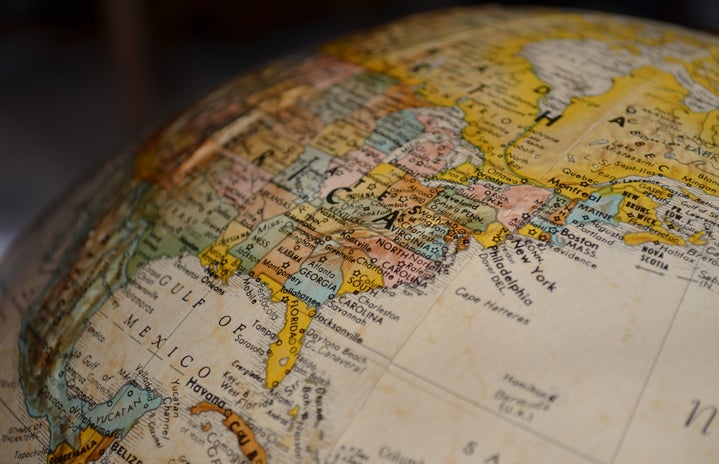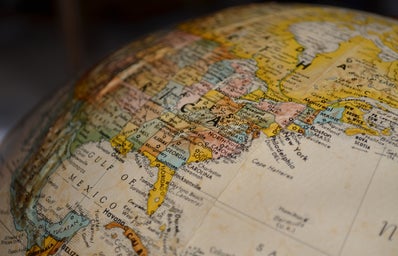Expressing myself never posed a problem, until I faced the challenge of communicating in another language.
I am a passionate person. I communicate through exaggerated gestures, dramatic facial expressions, and ridiculous words I use interchangeably to define everything. I love to talk about everything and anything. I tell stories, and I ramble whenever I’m excited. I am not afraid to express myself, but a few months ago, I faced the challenge of demonstrating who I am in a foreign language.
I have been learning English since I was a little kid and continue to do so. I’ve completed years of classes, exams, and certifications. Becoming fluent in the language has taken me a lot of time. I naively thought I wouldn’t encounter any more difficulties; I was obviously wrong. I noticed that when I started talking every day in my second language, I repeatedly ran into the language barrier whenever I tried to express my feelings. My English teacher taught me how to give presentations, not how to tell friends how I’m doing.
It’s as if the words weren’t enough for my thoughts and feelings. I couldn’t translate my feelings and felt confined to a small list of words.
At first, the language barrier stopped me from expressing myself and showing who I really am. In a way, I became a different version of myself. While I know that may sound ridiculous, it was true, at least to me. Now that I think about it, I became more timid. I tried to put myself out there and overcome the fear of speaking English in front of others. And while there were times when the fear overwhelmed me, there were other times when I was able to work through it.
My personality changes when I switch between languages. I believe there’s a correlation between who you are and your language. Because, to me, language is identity. It connects us with a group of people, with a culture, and with ourselves. This is why it’s very weird to start speaking in a foreign language constantly. Because you miss a part of yourself, and it’s a lonely experience. People around you might understand what you’re saying but won’t comprehend who you are.
I spent days thinking about the experiences and challenges I’ve faced throughout these past few months. To be honest, I felt alone and lonely. Because who would understand? It sounds ridiculous and easy to overcome, even if it isn’t.
It was not until I brought up the topic with a friend whose first language is also Spanish that I felt understood. After we had an insightful conversation over tea and crochet, I wondered if other people felt the same; there had to be.
Mafer
Spanish, English and French
Mafer first learned English because of school. The program required her to learn the language. Her interest in the language also came from the media she consumed as a kid. She was interested in learning not only for school but also to understand other media. “I think learning English is a really good skill, especially now that most communication happens in English,” she said.
Mafer does think that her personality changes when she talks in her second language. “I become a little bit more shy, especially because you feel a bit more insecure talking in a language that isn’t yours,” she explained. Mafer thought it’s easier to feel like that because you worry about how others perceive you. She asks herself questions like ‘Are the things I’m saying making sense?’, ‘What do people think of my English?’ and ‘Am I saying things, and are people ignoring them?’ Mafer believes that she doesn’t show her whole personality because she feels limited by the language. “Sometimes it is a little bit difficult to feel completely satisfied with the things I’m saying,” she said. She’s constantly aware of her usage of the language.
“Even though I consider myself good at English, there are certain things you have to be aware of that you’re not necessarily when you’re speaking your first language,” she explained. Mafer believes that she describes and expresses herself better in Spanish; then, she can be her true self.
Alex
French, English and Romanian
Alex grew up learning French in school, but because she was close to the border, she learned a lot of English. Because of this, she grew up knowing how to express herself in both languages. “I do think I have a different personality when I’m speaking French versus when I’m speaking English,” she said, “When I’m speaking [in] French, I may be less talkative.” Alex believes this is because she doesn’t want to make mistakes when speaking in French due to its difficulty. However, she talks a lot more in English because she knows so many expressions and common ways of talking in that language. “I’m just speaking English here, no one really speaks French,” she said. Alex explained that she doesn’t want to lose her ability to speak French.
She also speaks Romanian but believes that she’s less expressive and reserved when she does. While she knows the basics of language, her vocabulary is limited. “Let’s say I’m talking to my mom, speaking [in] Romanian, but eventually I’ll just be like inserting French or English words, or I’ll switch to another language,” she said.
Alex believes she can express herself better when speaking English and French. “I do a lot of ‘Franglais,'” she said. A lot of people do that where she comes from. Alex feels more comfortable during these moments, which puts her at ease when talking.
Iya
English, Filipino and French
Iya believes she can’t seem to express herself completely in another language, especially when she speaks Filipino. “When I was a kid, I used to speak the language a lot more, but because I grew up here, I lost the ability to speak it,” she explained. When talking with family members who aren’t fluent in English, she finds it difficult to express herself and say what she actually means. “I feel like I’m a talkative person in English, but when I’m trying to speak in another language, I suddenly become quiet,” she said. Iya recalled that when she recently went to the Philippines, she struggled to catch up with her family. “I’ve noticed that people here [Canada] people will tell me that I’m someone who rambles or talks a lot, but then when I’m over there [Philippines], my family is like, why are you so quiet,” she stated.
Through English, Iya can express her feelings and thoughts better, while in other languages, it’s more complicated. She has had a different experience with French because she never used it in other situations besides academics. “I remember finding it very strange, I’m more fluent in a language that I just had to learn for school than the language that my family speaks,” Iya said.
Lazourd
Arabic and English
Lazourd has been speaking Arabic for 18 years, and when she moved to Canada, she suddenly had to start speaking in English for the first time in her life. She self-taught English because her entire education had been in Arabic. She only had one English course, and she recalled that they taught her the basics and things she never used again. Her self-taught journey started when she was 14 or 15, “I felt the need to learn.” There were many resources online, so that’s where she began. Lazourd explained that throughout the years, she stored the language, but she never had a chance to speak it, which made it more difficult. “It’s not the same as your first language, never,” she said, “You feel like you’re always in an English Proficiency Test.”
She believes that when you speak a different language, you don’t sound different; you are different. “Your personality changes and I feel like there’s always that [language] barrier,” she stated. Lazourd explained that it affects not only your personality but also the decisions you make. For instance, she recalled a moment in class when the professor asked a question, and she wanted to voice out her answer but couldn’t. Not because she was wrong, but because there was a voice in her head that kept telling her, ‘Don’t do it, don’t do it.’ She said that she’s still trying to work on silencing that voice. “Even if I said something wrong, who cares?” Lazourd asked, “People don’t really care as much as we think they do.”
When asked how she feels throughout these situations she said, “It’s an exhausting experience, it’s like multitasking.” Lazourd explained that while she’s trying to concentrate on what she’s doing or saying, she’s also focusing on translating and evaluating whether it’s correct. “It’s hard to maintain a balance, and you’re always going to mix them up.” Sometimes she speaks English and thinks of terms in Arabic that she can’t translate.
Lazourd explained that it has become easier as time passes by. She emphasized that we should be proud of our knowledge and ability to speak various languages. “I am proud to be part of all of this and speak English, despite all of the hardships.”
I realized I wasn’t alone after talking with Lazourd, Mafer, Alex, and Iya. They understood me, and while we didn’t share the exact same experiences, we could understand each other’s feelings.
It has taken time to adjust to talking in English every day, and like everything, it’s a process. I have realized that expressing myself will inevitably differ, no matter which language I use. I do think that’s one of the beautiful things about languages; while they can be translated, they’re still so unique.
Expressing myself has gotten easier since that first encounter with the language barrier. I have made friends who understand me and are willing to listen to what I have to say. I think it’s important to surround yourself with considerate people. Friends who will acknowledge and validate how you feel. People who are empathetic won’t pressure you while trying to remember the word you suddenly forgot.
But most importantly, what helped the most was to give myself grace. I recognized that I needed to be more patient with myself. It’s crucial to congratulate ourselves for our accomplishments, in this case, learning and being able to speak another language. I think it’s inevitable to encounter the language barrier occasionally. I mean, we are talking in a foreign language, so it makes sense. Recognize that there will be days where the language flows right out of you, but there are some days where it takes a bit more effort, and that’s okay. It is a process, which means you have time. Time to learn, practice, and be patient with yourself and others.




